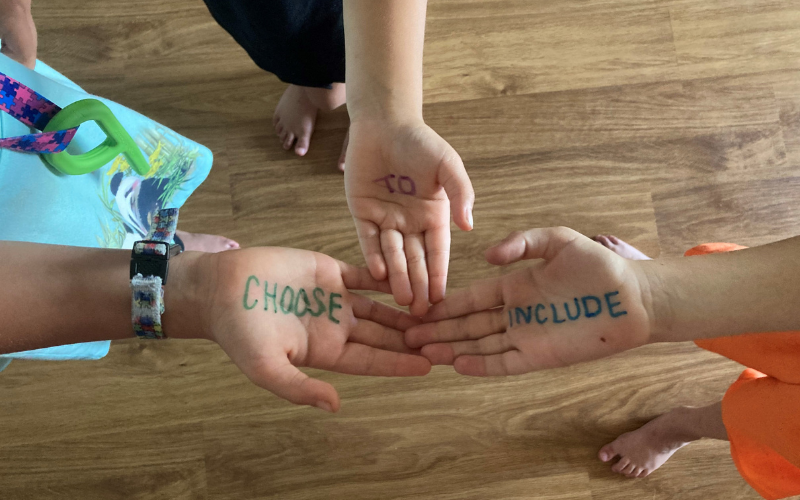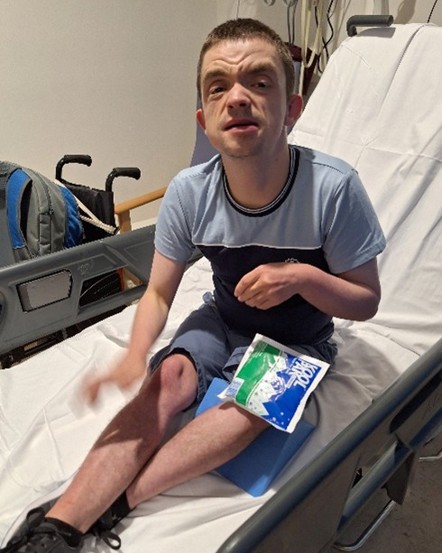Making a Way

Micah Pederson
I am a mom to two children biologically and many children through foster care. My husband and I have been married three years. Our foster home is a sp...

My son is eight years old. He has the best personality. He loves connecting with people and being involved in the conversations and activities happening nearby. He is non-verbal and using his eye-gaze communication device, he is one of the most talkative people around. One of the areas he excels in when it comes to speaking up is self-advocacy. He wants to be included, he knows he deserves to be included, and he will make this information known.
Recently, we encountered a situation where my other children had been included in an activity by an adult but my eight-year old had been left out. Although I was tempted to immediately intervene, I decided to step back a bit and see what would come of my son speaking up for himself. He began speaking about the activity, obviously ready to be included. When that was ignored, he moved to his self-advocacy page in his device and began to say “Please include me” repeatedly. When that, too, was ignored he added “that was not polite” in between the “Please include me.”
When even that level of speaking up for himself was utterly ignored, he turned the volume of his device to loud and continued saying the same phrases.
Nothing. At this point, I had enough, intervened, and took a more aggressive approach to requesting that he not be left out. The adult leading the activity made a comment that really caught me off guard. He said “I would have included him but there just really wasn’t a good way to do that” and went on to explain how difficult it would have been to include my son. The thing is, it wouldn’t have been hard. It would have taken very simple adapting.
This incident caused me to reflect on the different ways people choose or choose not to include my multiple children who have disabilities. My son did a lovely job advocating for himself. The fact that he was not included had nothing to do with son and everything to do with resistance to include (or perhaps ignorance and resistance to learn) on the adult’s part and an unwillingness to be seemingly inconvenienced.
Inclusion is always possible. Is it always easy? Maybe not. Does it always look how we thought it would? No. But I do believe it’s simpler than many people perceive. I have attempted to imagine something my children couldn’t be included in, in any capacity, due to their disabilities, and I cannot. There is never an excuse for excluding a person because of one person’s disability and or another’s own unwillingness.
If someone doesn’t know how to include, they should ask.
If they are unsure if a child is wanting to be included, they can ask the child. This concept is a simple one even to children. My own children have a keen sense of inclusivity. In fact, we have had to start working on learning that it’s ok to *not* include children on the playground who don’t want to be included rather than force them into the play taking place. If my young children can understand that humans ache to be connected and included, so can others.
I am weary of having to fight for inclusion and watch my children face the threat of being left out. Those who love my children well stand out because they are the ones who do whatever it takes to include every single one of them. Most importantly, they are willing to ask when they are unsure about how to include and in turn, accept guidance on how to improve.
Inclusion doesn’t have to be perfect and even acknowledging the person’s desire to be included goes a long way. While I fight for inclusion for my children and family every day of the week, there are some situations I will no longer battle against: I will no longer fight for my inclusion or my family’s inclusion within circles that are wholly unwilling to include my children—every single one of them.
People matter. Therefore, inclusion matters. Adaption matters. Effort matters. Excuses don’t. It’s ok not to know. It’s not ok not to learn. There is always, always a way. The key is understanding that we don’t always find a way to include and adapt. Rather, we have the privilege of *making* the way.


